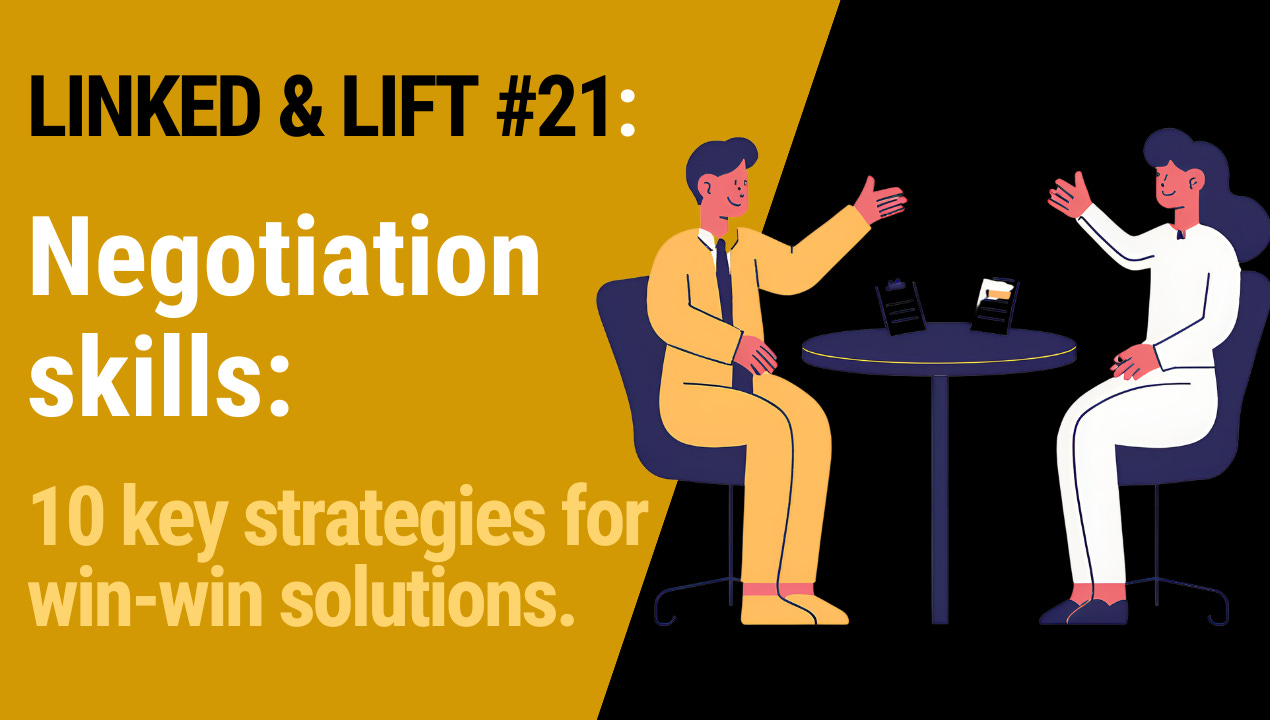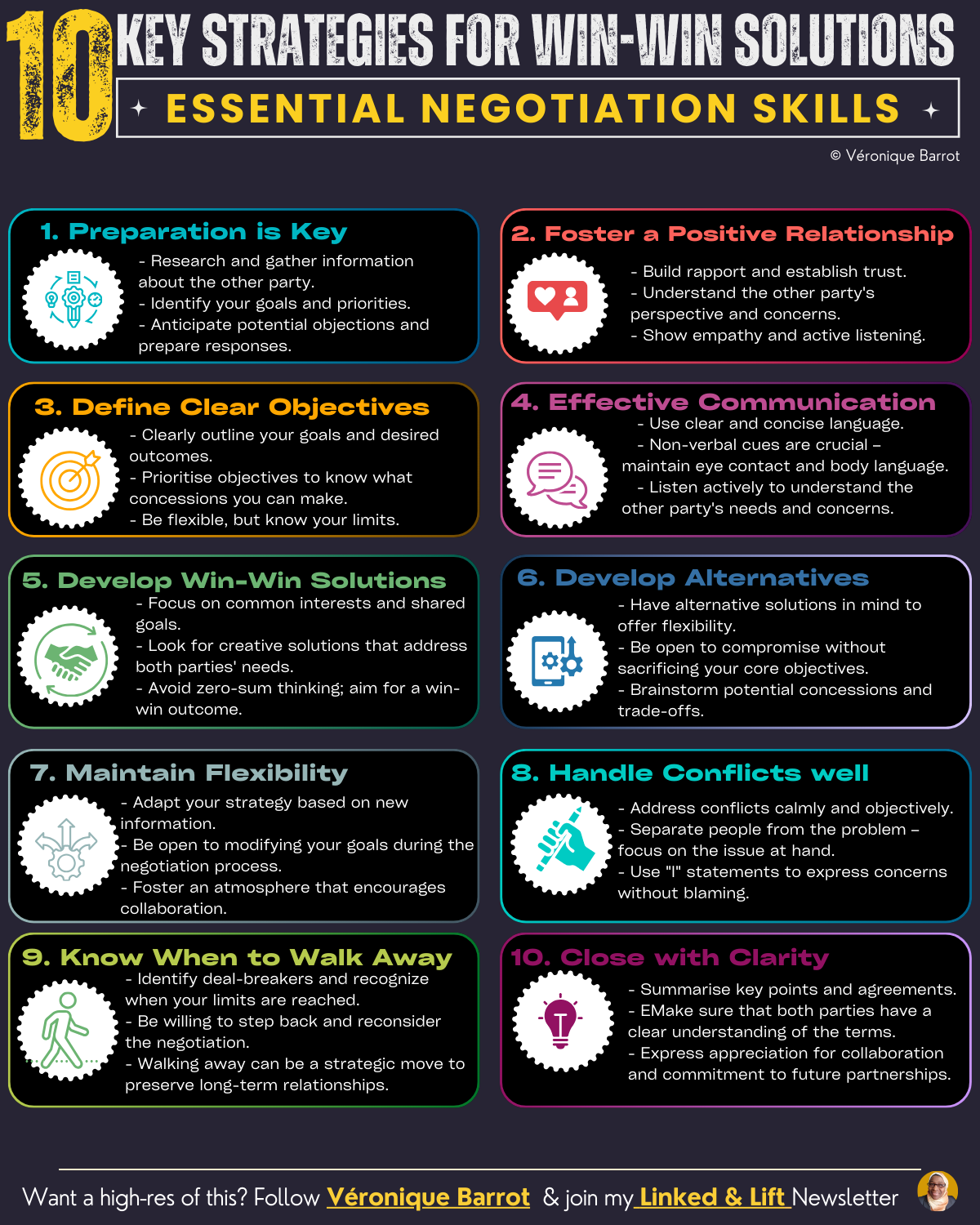L & L #21: Essential negotiation skills: 10 key strategies for win-win solutions.
[Reading Time: 4 mins]
Negotiation isn't just a skill; it's an art.
An art that embodies growth, empowerment, and leadership.
Whether you're discussing a salary raise, closing a business deal, or resolving a conflict, effective negotiation skills are needed.
Imagine transforming every negotiation from a battleground to a collaborative workshop, where all parties leave the table feeling satisfied and valued.
It's not just about winning;
It's about co-creating win-win solutions that fuel collective success and foster long-term relationships.
I created this infographic on 10 key strategies for win-win solutions to help you develop your negotiation skills. Click on it for a high-res PDF version.
Here are the 10 key techniques and strategies to reach win-win solutions in your negotiations.
1. Preparation is Key.
Preparation lays the groundwork for success.
Gather as much information as possible about the other party.
Understand their needs, goals, and potential objections.
Clarify your own objectives and prioritise them.
This groundwork allows you to anticipate challenges and formulate effective responses.
It's about aligning your goals with a deeper understanding of theirs,
↳ crafting a vision that accommodates mutual growth.
2. Foster a Positive Relationship.
Building rapport is the cornerstone of trust.
It's seeing the person behind the position, understanding their fears, ambitions, and challenges.
This empathy paves the way for a negotiation grounded in mutual respect and shared goals.
It transforms adversaries into collaborators
↳ and ensures that even when you disagree, you're not divided.
3. Define Clear Objectives.
Defining clear objectives is knowing not just what you want, but what you can give,
↳ understanding the difference between what's negotiable and what's non-negotiable.
This clarity helps you stay focused during the negotiation and makes it easier to identify which areas you can be flexible in.
Remember, being flexible does not mean compromising your core goals
↳ but rather finding a balance that works for both parties.
4. Effective Communication.
Communication is the cornerstone of successful negotiation.
Effective communication goes beyond words. It's recognising that every gesture, every pause, and every expression is a piece of the puzzle.
It's about listening with intent, speaking with clarity, and observing the unsaid.
Active listening shows respect and helps you understand the other party's needs and concerns.
This level of communication fosters an environment where creative solutions thrive.
5. Develop Win-Win Solutions.
Creating mutually beneficial solutions is the essence of a win-win outcome.
It's looking beyond the immediate to see the potential.
Look for creative solutions that serve both parties not just today, but in the future.
Avoid zero-sum thinking where one party's gain is the other's loss.
It's about transcending the transactional to build relationships
↳ that withstand the test of time.
6. Develop Alternatives.
Always have alternative solutions ready.
Flexibility helps you adapt to new information and changing circumstances.
Being open to compromise and trade-offs fosters collaboration and success.
7. Maintain Flexibility.
Negotiations often require adjustments and adaptability.
Be prepared to modify your strategy based on new insights and evolving discussions.
A flexible approach fosters an atmosphere of collaboration
↳ and increases the likelihood of a positive resolution.
8. Handle Conflicts Constructively.
Conflicts are a natural part of negotiations.
Address them calmly and objectively,
↳ focusing on the issue rather than the people involved.
Use "I" statements to express your concerns without placing blame.
Constructive conflict resolution strengthens relationships
↳ and leads to better agreements.
9. Know When to Walk Away.
Recognise when it’s time to walk away from a negotiation.
Identify your deal-breakers and understand your limits.
Walking away can be a strategic move,
↳ signalling that you value your objectives
↳ and are willing to reconsider your approach to find a better solution in the future.
10. Close with Clarity.
Summarise the key points and agreements reached during the negotiation.
Make sure that both parties have a clear understanding of the terms
↳ and express appreciation for their collaboration.
A clear and appreciative closing reinforces commitment
↳ and sets a positive tone for future interactions.
11. Continuous Improvement.
Negotiation is a journey of continuous growth,
↳ a path that calls for resilience, adaptability, and a commitment to perpetual learning.
Every negotiation is a lesson, a mirror reflecting our strengths and areas for improvement.
Embrace this journey with an open heart and a growth mindset,
↳ for in every negotiation lies the potential not just for a deal, but for transformation.
➥ Mastering these negotiation skills can transform your approach to conflicts and agreements, leading to more positive and productive outcomes.
Use my accompanying cheat sheet to keep these strategies at your fingertips.
Start negotiating for win-win solutions today!
Until next time,
Véronique.
P.S. Many of you have asked me about my infographics.
To anyone who wants to boost their posts' visibility, attract the right audience and grow their network: I offer coaching and personalised ‘done for you’ visuals. Reply to this email newsletter to find out about coaching sessions or the personalised visual services. You can also DM me on LinkedIn.
P.P.S. Sending a warm welcome to everyone who joined The Linked And Lift community since last week! Check the welcome email I sent you to find out how you can download, for free, all 60+ high-res PDF versions of my infographics.




